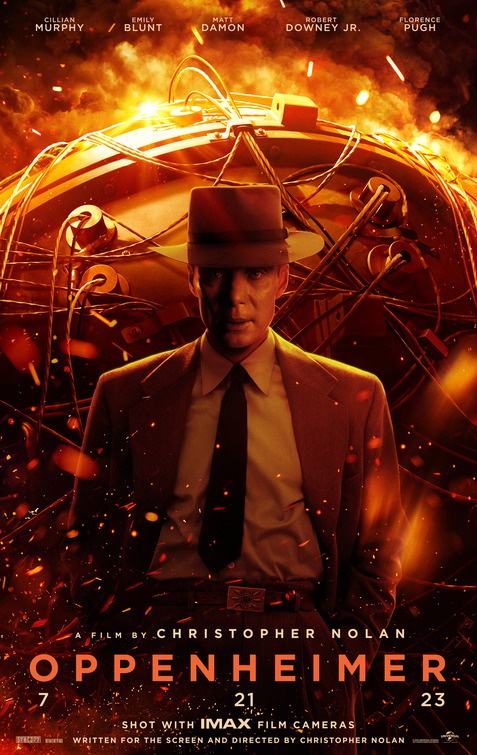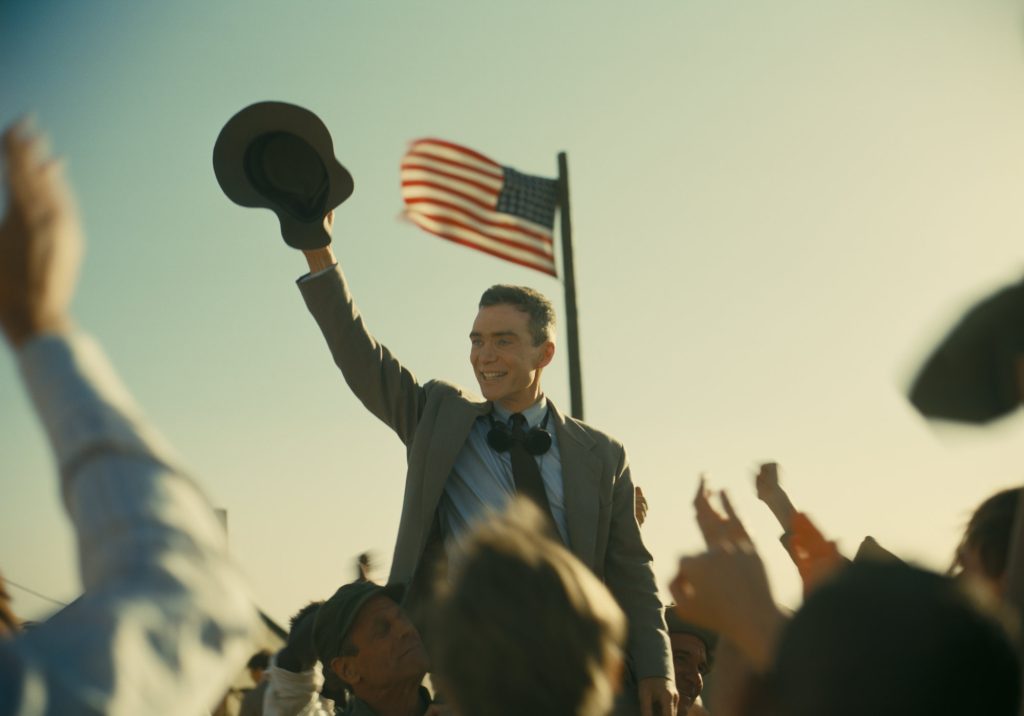
⭐⭐⭐⭐
Rating: 4 out of 5.Director Christopher Nolan has a preoccupation with time. As such, he eschews a linear chronology even when telling what could be a straightforward story. His biography of J. Robert Oppenheimer (Cillian Murphy) begins in 1954 at the start of a security hearing for the “father of the atomic bomb.” The renowned physicist is suspected of being a Communist sympathizer dating back to the 1930s. Admiral Lewis Strauss (Robert Downey Jr) spearheads the Senate meeting concerning Oppenheimer’s continued access to top-secret data. This proceeding frames the subsequent account.
Nolan’s twelfth feature jumps between two perspectives detailing Oppenheimer’s rise and fall from public life. The 1954 timeline of “Fission” is in color and told from Oppenheimer’s viewpoint. Then there is “Fusion,” set in 1959, filmed in black and white from the perspective of Lewis Strauss (Robert Downey Jr. ). Ah, but there are frequent flashbacks, occasionally skipping back and forth over the timelines that don’t play out sequentially. Eventually, the two timelines cross over with each other.
It sounds confusing, yet Christopher Nolan’s script is adept at creating an emotionally compelling chronicle recounting the events that led to the development of “the gadget”—a euphemism for the first nuclear weapon. I quickly grew to understand its structure. Oppenheimer utilizes a panoply of various individuals in a distended but talented cast. If the principals are at a hearing, it’s the present day; everything else is a flashback.
There is a coherent organization to the narrative. These flashbacks are organized into three distinct storylines. The youthful academic considers, “Can we build a bomb?” That’s the first part of the early days of quantum mechanics. Oppenheimer’s school days are depicted at Cambridge under Patrick Blackett (James D’Arcy). He attends a lecture by Niels Bohr (Kenneth Branagh). Then he studies at the University of Göttingen in Germany, where he encounters American physicist Isidor Rabi (David Krumholtz). They meet German professor Werner Heisenberg (Matthias Schweighofer). Later he begins teaching at Berkeley, where he’s introduced to Nobel Prize winner Ernest Lawrence (Josh Hartnett). Oppenheimer inaugurates his lectures with just one student, Giovanni Lomanitz (Josh Zuckerman), but later has a much larger and fuller class.
His reputation grows. General Leslie Groves (Matt Damon) and Lt. Colonel Kenneth Nichols (Dane DeHaan) recruit him to be the director of the Manhattan Project into the second and my favorite section, which I like to call “Let’s make an atomic bomb!” Hungarian physicist Edward Teller (Benny Safdie) is brought in. Even though Hitler died in April 1945 and the Germans had surrendered, the Japanese continued their wartime efforts. Therefore the team continues with their research. The middle culminates in an awe-inspiring test codenamed Trinity at Los Alamos Laboratory in New Mexico. We are brilliantly reminded that light travels faster than sound.
It all leads to a fateful act. President Harry Truman (Gary Oldman) infamously decides to drop atomic bombs on Hiroshima and Nagasaki. This is not depicted. Nevertheless, the resulting casualties weigh on Oppenheimer’s conscience. The final segment has Oppenheimer considering the morality of his work. He ponders the question, “Should we have created a bomb?” This last section feels the most disingenuous. Oppenheimer now comes to terms with the idea that everything the scientists were studying and doing was not a hypothetical exercise but ultimately led to an inevitable decision. A notable meeting between Harry Truman and Oppenheimer clarifies their mindsets perfectly. The President is irritated. “Don’t let that crybaby back in here,” Truman remarks after Oppenheimer leaves.
The chronicle is filled with an enormous cast that features an array of interesting characters. First and foremost is star Cillian Murphy who gives a transformative performance brimming with authenticity. An intellectual genius, introverted, and sometimes even socially awkward is not a typical personality on which to establish a biopic. Nonetheless, Murphy captivates our attention with a subtle performance of a charismatic leader that belies a massive ego. His true nature eventually shines through and burrows deep in our consciousness. As the chief antagonist, Robert Downey Jr. is unforgettable as Atomic Energy Commission chair Lewis Strauss and Oppenheimer’s foil.
This is a movie about men. However, Emily Blunt as his wife, Kitty, makes an impression when she is cross-examined near the end. Her response to the queries of Roger Robb (Jason Clarke) as special counsel is a scene tailor-made to garner a nomination. The fact that Emily Blunt has never been nominated should curry favor. Meanwhile, Florence Pugh, as Communist Party member Jean Tatlock is less dramatic. In reality, her appearance is regrettable. As a key romantic dalliance, Pugh’s contribution makes this the first Nolan release since Insomnia in 2002 to earn an R rating. Her topless scenes made me feel sympathy for the actress herself, not the character.
Oppenheimer is an epic profile predicated on talking. It’s based on the Pulitzer Prize-winning biography American Prometheus by Kai Bird and Martin J. Sherwin. Theoretically, this is more straightforward than the sprawling action adventures for which Christopher Nolan is known. However, it’s just as twisted and complex as his most labyrinthine efforts. It’s also 3 hours long, and yet I was never bored. Each scene unfolds at a rapid clip, and the many interactions of various personalities are edited to unfold one after another. Actors want to be in a Christopher Nolan picture, no matter how small the part. As my recounting of the plot illustrates, this picture has many speaking parts.
This feels like a blockbuster from an earlier era. It’s encouraging that this achieved an impressive $82 million in its weekend debut (a cumulative $117.9 million as of this writing). When was the last time a biography did that? I deemed last year’s Elvis the best film of the year. Even that widely acknowledged success earned a mere $31 million during its opening weekend. It wasn’t always this way. Once upon a time, audiences were dazzled not by special effects but by actors who simply talked. Directors like Stanley Kramer, Tony Richardson, Fred Zinnemann, and David Lean were responsible for major hits. Oppenheimer is a welcome throwback to when movies for adults ruled the box office.
What else is there to say? Nolan is supported by a talented team that promotes his vision. The film is well-shot by his go-to cinematographer Hoyte van Hoytema. He occasionally intercuts visual interludes and images that emphasize the discussions. Likewise, Richard King’s sound design frequently emphasizes the scene. The rumbling of stomping feet shook my seat during a memorable rally. Ludwig Göransson’s score is deeply atmospheric and elevates the conversations. Go to YouTube/Spotify right now and cue up the track “Can You Hear The Music.” Goosebumps, then tears. But in the end, Christopher Nolan’s screenplay reigns supreme. There’s a hyper-kinetic style that keeps you invested. It’s exhilarating to witness how his words fire off the screen like bullets from a gun. It’s less exciting than The Dark Knight or Inception but just as cinematic.
07-25-23


9 Responses
I have been following your site for quite some time now and I can say without question this is your longest review to date! 😀 Man, oh man, I’ve gone from being . . . anxious about seeing this (will Nolan show the bombing of Japan? how gory will this be with the R-rating? how confronting?) to now being fully, fully excited. I have waited a while to let some of the crowds die down too, but I think I’ll give up on that and go soon, seeing as this behemoth is sure to bring in some much-needed dollars at the box office for the foreseeable future.
Is Oppenheimer’s success more depressing or less depressing considering how it simultaneously seemed to wipe out any traces of Mission: Impossible Dead Reckoning. Saw that last night and there were 3 other people in a 300-person auditorium.
Yes, see it soon. I look forward to reading your review.
Perhaps I did get carried away, but if any movie should inspire my longest review, a three-hour epic biography from Nolan would seem appropriate.
Oh I didn’t think you got carried away — you’ve really got me excited for this thing! And the prospect of reviewing it myself is intimidating lol
Your review leaves the impression that the movie lets the viewer decide where virtue lay, if anywhere, in bringing the atomic bomb into existence. The book on which it was based very much bought into the standard convention that Oppenheimer was a hero for his part in making the bomb, a martyr for being denied his clearance and Strauss and Teller were rats. It would be nice to think that somebody in the entertainment business is capable of seeing past the standard view on anything.
I may have minimized the emphasis placed on Lewis Strauss as the villain. Personally I did find Oppenheimer’s subsequent regret a bit insincere and highly convenient after a lifetime of pursuing the goal of creating the bomb. Regardless it’s still a fascinating portrait of a flawed man.
A comment on another aspect of the film. Naively I would have thought that a scrambled chronology would detract from understanding this individual especially, since I think it’s safe to say that at every point in his life Oppenheimer was very much a product of what he’d gone through to that time. You obviously thought the adopted approach worked, but do you think it might’ve been better if the story had been told linearly?
No. I think it added interest in this case.
Even though this was 3 hours, this was great! The acting was superb, I understood the story. What can I say. I agree, this will garner many Oscar moms. Shout out to the amazing Score. Only negative: Florence Pugh is too good an actress for this role.
4 ⭐️
I got fed up with the Nolan fella faffing about with time a long time ago. Pun intended. Time he flexes like a bore……but to try and drum up some enthusiasm for the marathon I began watching the Oppy series currently on Iplayer. Jesus Wept, it was like time standing still so dry and mundane was the early stage story telling. So I dumped it.